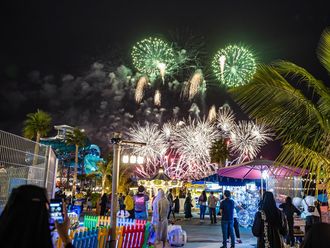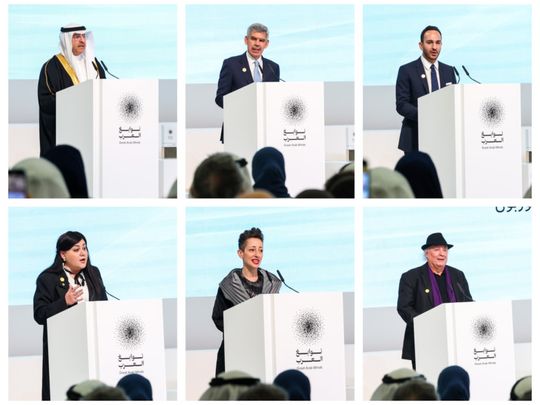
Dubai: They are top talents who left the Arab world and excelled in various fields. The winners of the first edition of the Great Arab Minds awards, who were conferred with the Dh1million award in Dubai on Monday, will now give back to their community back home to empower the disadvantaged and enable young Arab minds to grow with their prize money.
His Highness Sheikh Mohammed bin Rashid Al Maktoum, Vice President and Prime Minister of the UAE and Ruler of Dubai honoured the six winners of the prestigious award instituted by him at a glittering ceremony at the Museum of the Future.
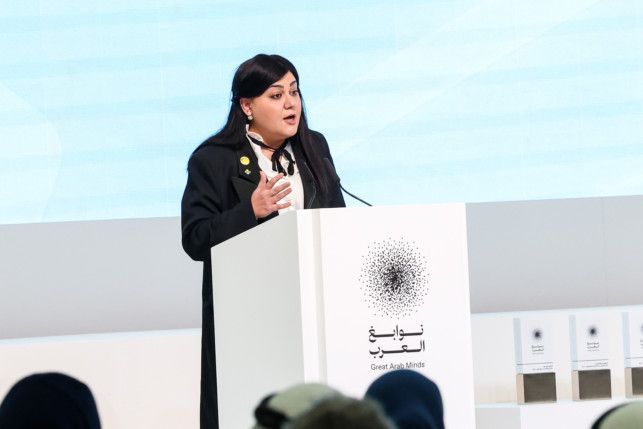
Speaking to Gulf News after the award ceremony, the renowned winners, working in different parts of the world, shared their plans on spending the prize money.
From educating displaced war-hit Palestinians and aiding innovative researches benefitting the mankind to empowering women in science, engineering and literature, the scientists, intellectuals and academics have shared great plans to have meaningful impact in the Arab world.
US-based Saudi cardiac surgeon Dr Hani Najm, who won the award in the category of medicine, said he deemed it a privilege and a delight to be the holder of the Great Arab Minds award.
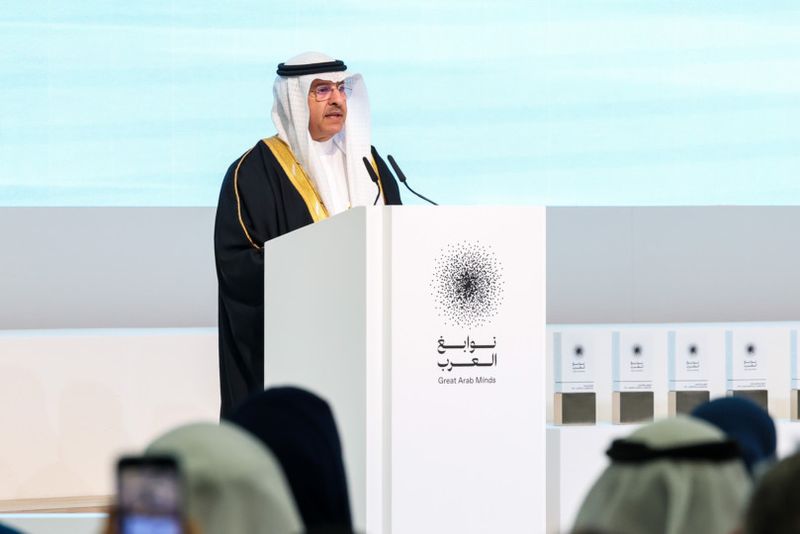
“This is an incredible honour and I think the future is bright for all of us in the Arab world. I believe this is a great incentive for us to move forward and dominate the world.”
On his plans for the prize money, he said: “It is going to be spent on my invention and to sponsor some of the young Arab doctors to come to the United States to train in certain areas.”
Dr Najm, chair of Pediatric and Congenital Heart Surgery at Cleveland Clinic, Ohio, has developed a gradually “self-expanding heart valve” for children with congenital heart diseases, sparing them the need for repeated surgery for valve replacement.
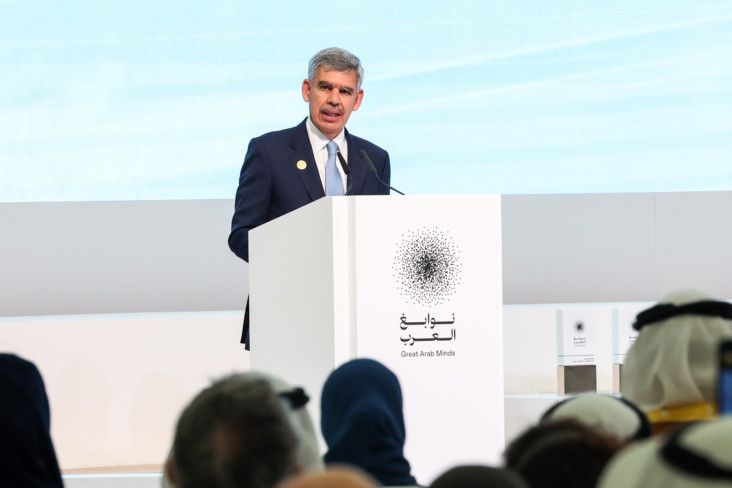
“This is valve that grows with the children and I’m hoping for a human implantation in the coming couple of years,” he said.
For Egypt and Palestine
Egyptian-American economist Dr Mohamed El-Erian was awarded for his exceptional contributions to the field of economics and his perceptive analysis of changes in economic and financial systems.
The president of Queens’ College, Cambridge University, Dr Mohamed said in his acceptance speech: “All the proceeds of this generous award will go to enable Arab minds to grow specifically through supporting the provision in the Arab world of two critical factors – indeed, pre-conditions for those seeking to overcome huge challenges – health and education.”
He told Gulf News that the health fund will be to support a cancer hospital in Egypt for children and the education fund will be to help in the education of Palestinians that have been displaced by the recent developments.
“My hope has been, and continues to be, to give back by mentoring and empowering more young minds, encouraging them to explore and unleash their passion, and reminding them of the importance of purpose and service,” he added.
Women in science, engineering
Lebanese scientist and academic Prof Niveen Khashab (Natural Sciences) won the honour for her outstanding contributions to the fields of chemistry, bioengineering, and biology.

Associate dean of Physical Sciences and Engineering and Programme and chair of the Chemistry Department at King Abdullah University of Science and Technology (KAUST), Saudi Arabia, Prof Niveen highlighted that some people had found her crazy when she decided to pursue a scientific career in an Arab country. “I accepted the challenge and started my academic journey. Today, the department of Chemistry at KAUST is ranked 10th globally,” she said with pride.
Speaking about how she wishes to give back to the community, she said: “I always work a lot on women in science and engineering. I actually have a yearly workshop called WISE, Women in Science and Engineering. So, every year I’m going to have a part of the award to sponsor young female students who want to do chemistry to come and work in my lab for some time to actually promote more Arab women in science.”
Youth in technology
Lebanon-born engineer, who is now an assistant professor at the renowned Massachusetts Institute of Technology (MIT), Prof Fadel Adib won the award in engineering and technology for his exceptional contributions to the fields of wireless technology and wireless sensing.
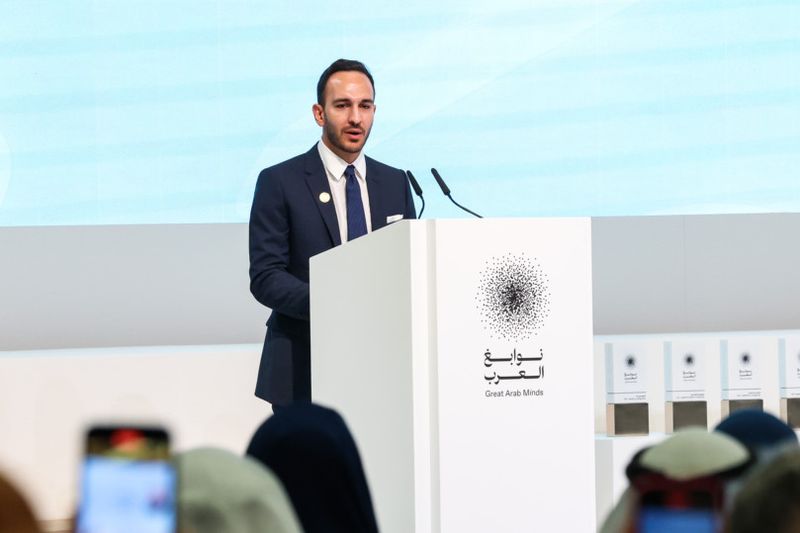
With a track record of over 80 research papers and patents, the Prof Fadel, who is also the youngest among the winners, said the recognition was a testament to the capability of Arab minds in engineering and technology in addressing global challenges.
“I’m grateful for a prize that comes specifically from the Arab world with this recognition because many of us have received many international prizes, but an award that comes from home is closer to the hearts always,” he said.
On his plans with the prize money, he said: “I hope to be able to use it to give back to the Arab youth and continue supporting them and innovating and showing them the path of how I got here and supporting them to move forward.” He said there would be further announcements about his plans in the future.
Sustainable architecture
Architect and professor of Architecture Professor Lina Ghotmeh, who teaches architecture at a number of international colleges and universities, was honoured for her global architectural contributions.
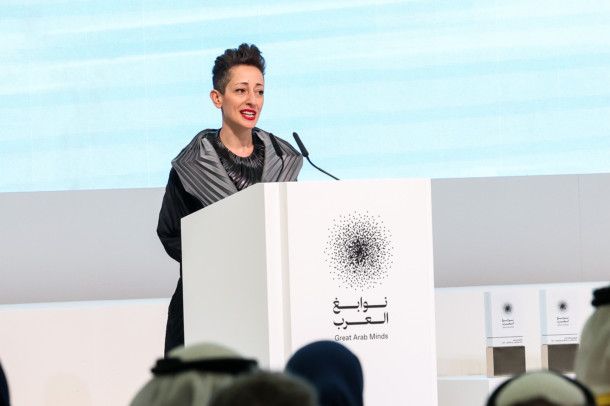
“As an architect committed to improving the environment, I see this award as a recognition of the pivotal role our discipline plays in shaping and strengthening the identity of the Arab world,” she said.
“Thinking about our environment is at the heart of our interests in architecture as our built environment is responsible for more than 40 per cent of our carbon emissions,” pointed out Prof Lina whose team has built the first net positive, low-carbon building in France. “I hope that the future contemporary art museum I am designing in Al Ula, Saudi Arabia, will follow this approach.”
She said she will make use of the award’s fund to enable “future generations to innovate while remaining deeply connected to our architectural heritage and cultural identity that is unique in the Arab world.”
Translating Arabic masterpieces
Novelist and chair professor of Arabic literature at the University of Algiers and Sorbonne University in Paris, Prof Waciny Laredj, was awarded for his outstanding contributions to Arabic literature.
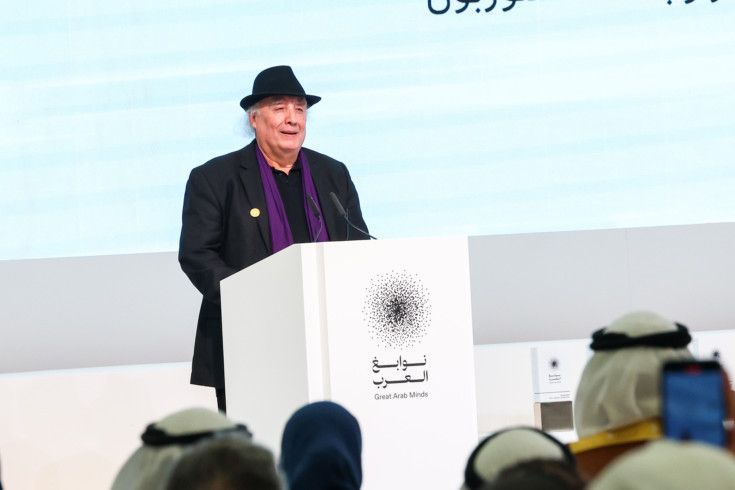
The author of over 30 novels and books said he has two ideas to ensure the huge sum from the award will be well spent.
“The first is to establish an Arab foundation for translation because I perceive it as crucial in conveying my culture to others. How can I effectively communicate my culture to a broader audience? Same as we translate from Chinese and Hindi, extending the same to transfer my culture and words to others is of great significance to me.”
He said the second idea involves creating an award to recognise women’s literature, providing support for female narrators and writers.
“It may seem unconventional for a man to supervise a prize for women’s literature, but this aligns with my unique idea and vision. These are my two major initiatives. On the other hand, I will continue conducting cultural workshops, particularly for young writers, focusing on the foundations of writing and composing novels,” he added.
The Great Arab Minds movement is designed to seek and identify Great Minds in the Arab world, from the exceptional talents of scholars, intellectuals, inventors, innovators and Arab creators in various fields, in order to care for them, empower them and develop their ideas in collaboration with the best global partners, maximising their positive impact in the region.
Dubbed as the Arab Nobel Prize, the initiative serves as a strategic step towards driving the intellectual renaissance in the Arab world and reversing the brain drain seen across the region.
Each year, the Arab world suffers billions in losses, besides the squandered development opportunities, due to the emigration of Arab scientists, specialists, intellectuals, doctors, and engineers.
Analysts and experts estimate such losses at around Dh7 billion per annum, with this brain drain also causing a decline in technological and scientific progress, as well as in the number of issued patents in the Arab world as compared to the global average.
On Monday, Sheikh Mohammed also announced the launch of a new research and knowledge centre within the Museum of the Future to permanently support the scientific and knowledge journey of Arab geniuses under the ambit of the Great Arab Minds award.




